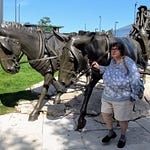
Podcast: 50 Minutes. Listen Now, or Download to Your Favorite App for Later, by clicking on “Listen in Podcast App” above right.
Oliver Twist. That’s probably who you think of when you think of workhouses, and you’re not far wrong. But how did English people get to the point that they thought cruelty to children was okay? And how did they move away from it? This is a story that’s disconcerting, no matter your views on how to deal with poverty.
This the podcast version of The Workhouse Effect, Annette’s original post at Non-Boring History, based on The Workhouse, by Norman Longmate. Read it here:
Enjoy this? Share the love, and send it to a friend, suggesting they sign up for Non-Boring History!















Share this post